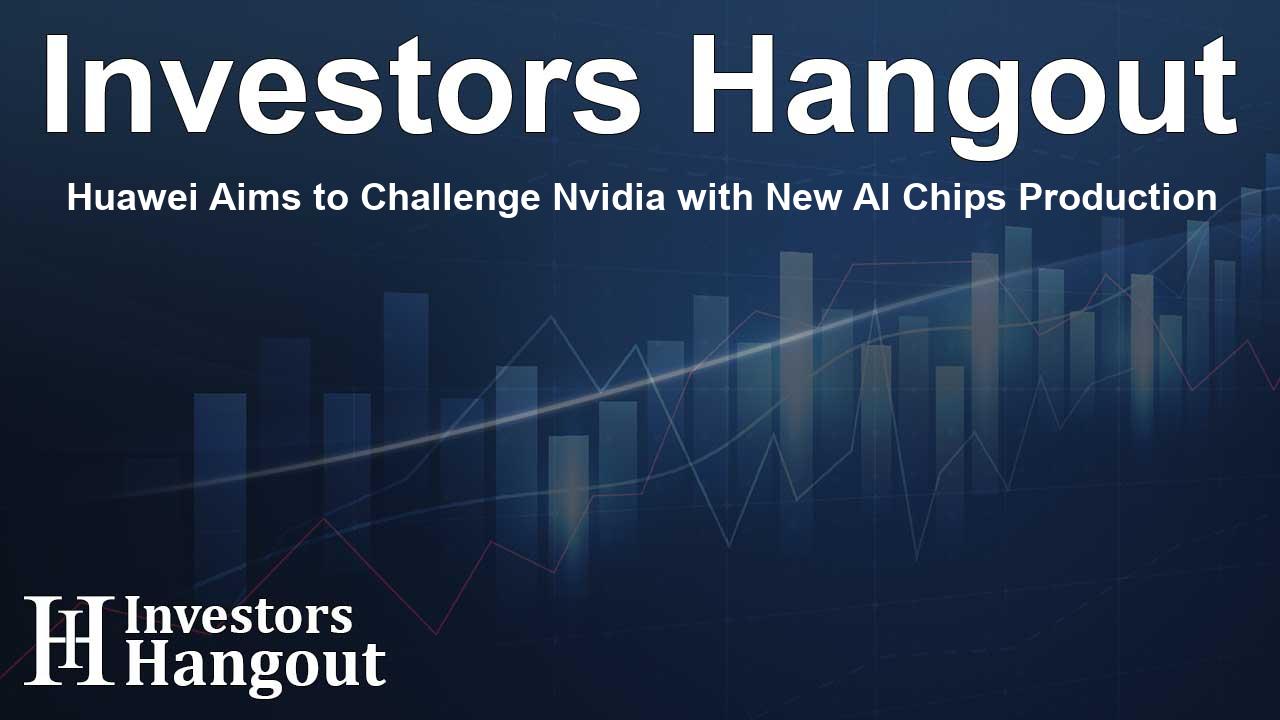Huawei Aims to Challenge Nvidia with New AI Chips Production

Huawei's Ambitious Plans for AI Chip Production
Huawei Technologies Co., Ltd. is gearing up to kick off mass production of its innovative AI chip, the Ascend 910C, by early 2025. This move comes despite the ongoing challenges posed by U.S. trade restrictions, which have significantly affected Huawei's operations.
Overview of the Ascend 910C Chip
The Ascend 910C is designed to compete directly with products offered by U.S. AI chipmaker Nvidia Corp. Huawei’s efforts to make a mark include distributing samples of this chip to various technology companies and actively accepting orders. Although positioned as a formidable competitor, Huawei remains at the center of U.S.-China trade tensions, which were intensified following restrictions imposed by Washington over national security concerns.
The Impact of U.S. Restrictions
These stringent U.S. regulations have not only impacted Huawei’s chip production but also posed serious challenges in achieving the high yields essential for successful commercial deployment. The Ascend 910C is being produced by Semiconductor Manufacturing International Corp using its N+2 process. Unfortunately, due to a lack of advanced lithography tools, the chip's production yield is reportedly restricted to about 20%.
Current Processor Challenges
Huawei's existing processor model, the 910B, is also experiencing yield challenges leading to lowered production targets. As a result, the ongoing U.S. restrictions exacerbate these issues by limiting access to essential lithography technology from ASML, a Dutch company. Despite these setbacks, Huawei is looking to focus on strategic government and corporate orders as a priority for its new chip.
The Broader Geopolitical Context
The ramifications of U.S. tightening regulations on Huawei are significant. In recent months, the Biden administration moved to revoke export licenses for leading U.S. semiconductor companies such as Intel Corp and Qualcomm Inc., which has prohibited these firms from supplying vital chips to Huawei. This action underscores a greater strategy to limit Huawei’s capabilities in the tech arena.
Legislative Actions and Industry Responses
In October, U.S. lawmakers called on the Department of Commerce to act decisively against Huawei’s alleged attempts to circumvent sanctions through a clandestine network of semiconductor facilities, involving companies such as Pengxinxu and SwaySure Technology. This kind of oversight reflects the heightened geopolitical stakes as the U.S. works to curtail Huawei's influence.
Recent Developments Affecting AI Chip Production
In a notable turn of events, the U.S. recently requested that Taiwan Semiconductor Manufacturing Co. halt shipments of cutting-edge chips used in AI applications for Chinese customers after identifying one of its chips within a Huawei AI processor. This directive is part of a larger intent to stem the flow of technology to Chinese firms like Huawei.
Future Prospects for Huawei's Ascend 910C
Despite the ongoing obstacles, Huawei is determined to carve out a niche in the competitive AI chip market. With the Ascend 910C on the horizon, industry watchers will be keenly observing how this technology will perform against dominant players like Nvidia, especially amid the prevailing geopolitical landscape.
Frequently Asked Questions
What is Huawei's new chip called?
The latest AI chip from Huawei is named the Ascend 910C.
When is Huawei planning to start production of the Ascend 910C?
Huawei aims to begin mass production of the Ascend 910C in early 2025.
How has U.S. policy affected Huawei’s chip production?
U.S. trade restrictions have hindered Huawei's production capacity and access to crucial technologies, limiting chip yields.
Which companies are involved in the semiconductor supply chain for Huawei?
Semiconductor Manufacturing International Corp is responsible for producing the Ascend 910C, but others like Intel and Qualcomm have their exports restricted.
What are the competitive challenges Huawei faces with the Ascend 910C?
Huawei's main competition will come from leading AI chipmakers like Nvidia, especially given the technological edge and resources available to these firms.
About Investors Hangout
Investors Hangout is a leading online stock forum for financial discussion and learning, offering a wide range of free tools and resources. It draws in traders of all levels, who exchange market knowledge, investigate trading tactics, and keep an eye on industry developments in real time. Featuring financial articles, stock message boards, quotes, charts, company profiles, and live news updates. Through cooperative learning and a wealth of informational resources, it helps users from novices creating their first portfolios to experts honing their techniques. Join Investors Hangout today: https://investorshangout.com/
Disclaimer: The content of this article is solely for general informational purposes only; it does not represent legal, financial, or investment advice. Investors Hangout does not offer financial advice; the author is not a licensed financial advisor. Consult a qualified advisor before making any financial or investment decisions based on this article. The author's interpretation of publicly available data shapes the opinions presented here; as a result, they should not be taken as advice to purchase, sell, or hold any securities mentioned or any other investments. The author does not guarantee the accuracy, completeness, or timeliness of any material, providing it "as is." Information and market conditions may change; past performance is not indicative of future outcomes. If any of the material offered here is inaccurate, please contact us for corrections.